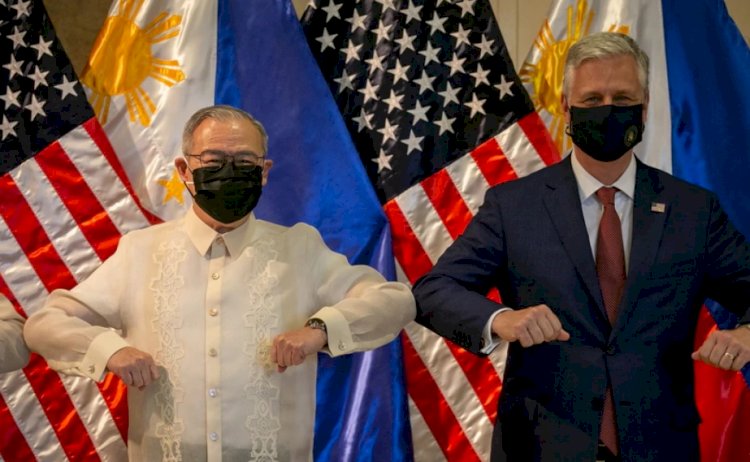High-Level US Visit to Asia Seen as Locking In Trump's Tough China Policy
“Relations thus, need to be kept up and maintained,” King said. “After all, Manila's a U.S. treaty ally.”

High-Level US Visit to Asia Seen as Locking In Trump's Tough China Policy
TAIPEI, TAIWAN - U.S. national security advisor Robert O’Brien is visiting Vietnam and the Philippines this month to help bulk up international resistance against Chinese maritime expansion, a sore spot between the superpowers, in ways that outlast President Donald Trump's term in office, analysts say.
O’Brien met with Vietnamese Prime Minister Nguyen Xuan Phuc during a November 20-22 trip. The national security advisor “reaffirmed U.S. support for a strong, prosperous, and independent Vietnam that contributes to international security and respects the rule of law,” the U.S. Embassy in Vietnam said in a statement.
U.S. officials often cite rule of law and security cooperation to contrast what they like about Southeast Asian states against Washington’s view of China as a country that does things its own way.
The U.S. official’s trip following a Vietnam visit last month by Secretary of State Mike Pompeo fortifies the current U.S. position of building up allies from Japan to Australia as a multi-country barrier against Chinese maritime expansion, analysts believe.
“Most of us would agree it is a position that has implicitly been mentioned in the past, but now the U.S. government is making it more strongly explicit in support of those claims,” said Collin Koh, maritime security research fellow at Nanyang Technological University in Singapore.
Vietnam and the Philippines have faced off over the years against Chinese fishing, energy exploration and military activities in the contested South China Sea. Both say China is operating in their exclusive economic zones, which extend 370 kilometers offshore.
“Hanoi and Manila are the only claimants to have ever really stood up to Beijing on the South China Sea, so it stands to reason these are the two countries O'Brien's chosen to visit,” said Sean King, vice president of the Park Strategies political consultancy in New York.
Pompeo set the tone for visits such as O’Brien’s in July by calling the Chinese maritime claims illegal and vowing support for countries that dispute sovereignty with China. Brunei, China, Malaysia, the Philippines, Taiwan and Vietnam each call all or part of the South China Sea their own in the search for fish and undersea energy reserves.
Vietnam's prime minister and his guest agreed to continue cooperating "in order to cope with common challenges, thus significantly contributing to peace" in Asia, the Communist Party of Vietnam's news website Nhan Dan Online reported Sunday.
People in Vietnam saw the O’Brien visit as one in a series by American officials, but hope it helps lock in a U.S. foreign policy that continues after Joe Biden takes office as U.S. president, said Jack Nguyen, a partner with the business advisory firm Mazars in Ho Chi Minh City.
The visit had probably been on the books for a while and will inspire the U.S. Congress into next year rather than influencing Biden, said Nguyen Thanh Trung, Center for International Studies director at the University of Social Sciences and Humanities in Ho Chi Minh City. Biden will focus on domestic U.S. issues rather than Asia at the start, he predicted. Congress has been aligned with Trump on Asia policy over the current presidential term.
“I think [the impetus for the O'Brien trip] comes from the bipartisan policy on China and also on the South China Sea,” he said. “I think it mainly comes from the Congress rather than from the (Trump) Administration.”
China has alarmed Southeast Asian claimants to the 3.5 million-square-kilometer sea by landfilling disputed islets for its own use, including military purposes.
Trump’s government regularly sends Navy vessels into the sea, sells arms to countries that have disputes with China and confers with pro-Western allies such as Australia and Japan on China matters. China cites historic documents to back its maritime claims and accuses the United States of trying to contain Chinese expansion.
Washington is separately vying with Beijing over trade and the sharing of technology -- all hallmarks of the Trump years. Trump is due to leave office in January.
Vietnam has clashed with China at sea since the 1970s and and in April a Chinese surveillance vessel caused a Vietnamese fishing boat to capsize. Despite the U.S.’s wartime history with Vietnam in the 1960s and 1970s, the two sides began collaborating more on defense in 2016.
Manila and Beijing got into a standoff in 2012 over the disputed sea’s Scarborough Shoal, where Chinese ships pushed Philippine vessels out of a rich fishing ground. Manila won world court arbitration four years later, but China snubbed the outcome and Philippine President Rodrigo Duterte looks to Beijing today for development aid.
The Philippines has sent “contradictory messages on the South China Sea” though the population and military “remain pro-American”, King said. A U.S.-Philippine Visiting Forces Agreement still hangs in the balance after Duterte’s government said earlier this year that Manila would cancel it – but announced this month a second six-month extension.
“Relations thus, need to be kept up and maintained,” King said. “After all, Manila's a U.S. treaty ally.”
The Philippine Department of Foreign Affairs had not posted information on O'Brien's visit as of mid-Monday.
VOA







































